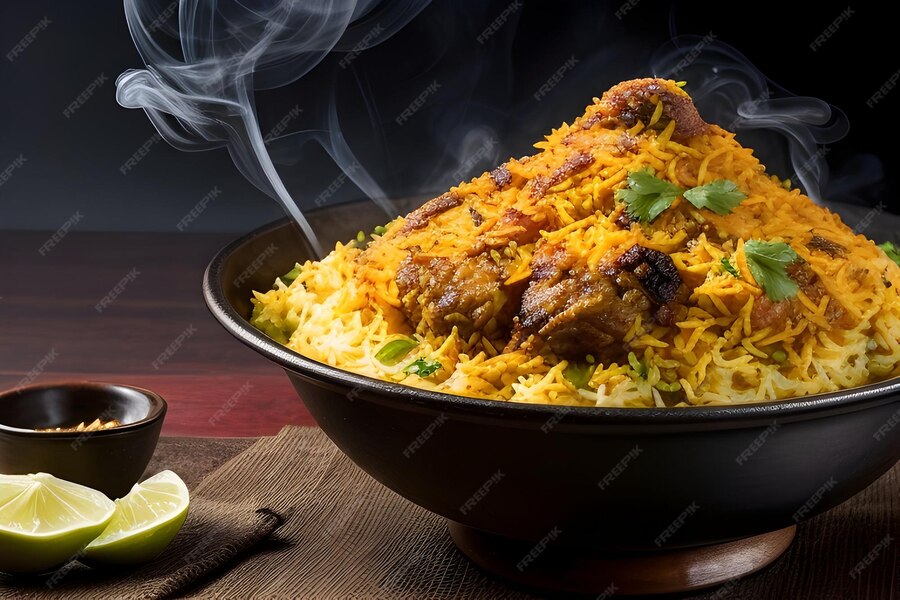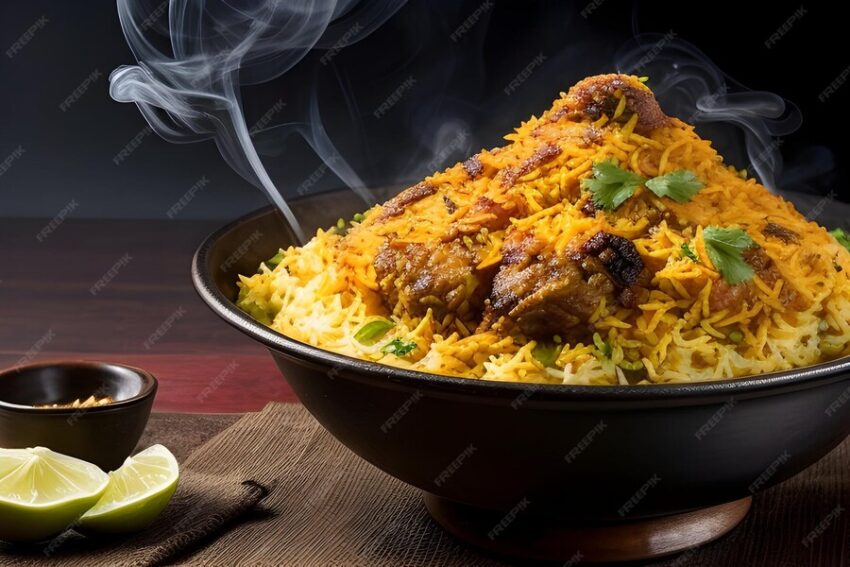
The Ultimate Guide to Biryani Plate Zabihah: Authenticity, Taste, and Tradition
Are you searching for the perfect biryani plate zabihah? Look no further! This comprehensive guide will delve into every aspect of this delectable dish, ensuring you understand its significance, appreciate its nuances, and discover where to find the most authentic and flavorful experiences. We’ll explore everything from the preparation methods and key ingredients to the cultural importance and modern interpretations of this classic meal. We aim to provide more than just information; we want to give you the knowledge to confidently choose and savor the best biryani plate zabihah available.
This article will provide an in-depth exploration of what constitutes a truly exceptional biryani plate zabihah. We’ll cover the critical aspects of Zabihah halal meat preparation, the art of biryani cooking, the essential spices, and what to look for in an authentic serving. By the end of this guide, you’ll be equipped with the knowledge to discern quality, appreciate the culinary artistry, and confidently select the perfect biryani plate zabihah to satisfy your cravings.
Understanding the Essence of Biryani Plate Zabihah
The term “biryani plate zabihah” encapsulates several crucial elements: the type of dish (biryani), the method of serving (plate), and the adherence to Islamic dietary laws (Zabihah). Let’s break down each component:
What is Biryani?
Biryani is a mixed rice dish originating from the Indian subcontinent. It’s typically made with rice, spices, meat (chicken, mutton, beef, or seafood), and vegetables. The rice and meat are often cooked separately and then layered together, allowing the flavors to meld beautifully. The aroma and taste of biryani are truly unique, making it a beloved dish across cultures.
The Significance of “Plate”
The “plate” signifies an individual serving of biryani, typically a generous portion meant to be enjoyed as a complete meal. It represents convenience and accessibility, making it a popular choice for both dine-in and takeout options.
Zabihah: Halal Meat Preparation
“Zabihah” is an Islamic term referring to the prescribed method of slaughtering animals for food consumption. It ensures the animal is treated humanely and the meat is halal, meaning permissible for Muslims to eat. Key aspects of Zabihah include:
- The animal must be healthy and alive at the time of slaughter.
- A Muslim must perform the slaughter, invoking the name of Allah (God).
- The animal’s throat must be cut with a sharp knife, severing the jugular veins, carotid arteries, and trachea in a single, swift motion.
- The animal must be allowed to bleed out completely.
The Zabihah method is not merely a ritual; it’s a commitment to ethical and humane treatment of animals, ensuring the meat is pure and permissible according to Islamic principles.
The Importance of Authentic Zabihah
For many Muslims, consuming Zabihah meat is a matter of religious conviction. Therefore, when seeking a biryani plate zabihah, it’s crucial to ensure that the meat used is genuinely Zabihah-certified. This requires verifying the source and the slaughtering practices of the meat supplier.
Identifying Authentic Zabihah Biryani Plate
Finding a truly authentic biryani plate zabihah requires careful consideration. Here are some key factors to look for:
Source Verification
Inquire about the source of the meat. Reputable restaurants and food establishments will be transparent about their suppliers and their Zabihah certification. Look for certifications from recognized Islamic organizations or halal certification bodies. Don’t hesitate to ask questions about the slaughtering process.
Ingredient Quality
Authentic biryani relies on high-quality ingredients. The rice should be aged basmati, known for its long grains and fragrant aroma. The spices should be fresh and flavorful, contributing to the dish’s distinctive taste. The meat should be tender and succulent, indicating proper preparation and cooking.
Traditional Cooking Methods
Authentic biryani is often cooked using traditional methods, such as the dum pukht technique. This involves slow-cooking the biryani in a sealed pot, allowing the flavors to infuse deeply into the rice and meat. This method requires skill and patience, resulting in a richer and more flavorful dish.
Flavor Profile
A well-prepared biryani plate zabihah should have a balanced flavor profile. The spices should be aromatic but not overpowering, complementing the taste of the meat and rice. There should be a subtle hint of sweetness, sourness, and spiciness, creating a complex and satisfying culinary experience.
Presentation
While taste is paramount, presentation also matters. The biryani should be served attractively, with the rice and meat arranged artfully on the plate. Garnishes, such as fried onions, cilantro, and mint, add visual appeal and enhance the overall dining experience.
Exploring Different Types of Zabihah Biryani
Biryani is a versatile dish with numerous regional variations. Here are some popular types of biryani plate zabihah you might encounter:
Hyderabadi Biryani
Originating from Hyderabad, India, this biryani is known for its rich flavors and aromatic spices. It typically features marinated meat (usually mutton or chicken) cooked with basmati rice, saffron, and a blend of fragrant spices. Hyderabadi biryani is often considered one of the most authentic and flavorful biryani varieties.
Lucknowi (Awadhi) Biryani
This biryani style hails from Lucknow, India, and is characterized by its delicate flavors and subtle aromas. The meat is marinated in a blend of spices and yogurt, then slow-cooked with rice in a sealed pot. Lucknowi biryani is known for its tender meat and fragrant rice.
Sindhi Biryani
Popular in the Sindh province of Pakistan, Sindhi biryani is a spicy and flavorful variation. It often includes potatoes, plums, and yogurt, adding a unique twist to the traditional biryani recipe. Sindhi biryani is known for its vibrant colors and bold flavors.
Bombay Biryani
This biryani style is popular in Mumbai, India, and is characterized by its sweet and tangy flavors. It often includes potatoes, dried plums, and kewra water, adding a unique aroma and taste. Bombay biryani is a flavorful and satisfying option for those who enjoy a slightly sweeter biryani.
Saffron Road: A Provider of Zabihah Foods
While this guide focuses on understanding biryani plate zabihah, it’s helpful to consider companies dedicated to providing halal options. Saffron Road is one such brand specializing in halal-certified frozen meals, including biryani. They aim to make globally-inspired, halal-compliant food accessible to a wider audience.
Saffron Road’s Chicken Biryani: A Closer Look
Saffron Road offers a frozen Chicken Biryani that aligns with the principles of Zabihah. While a frozen meal differs from a freshly prepared plate, understanding its features can help illustrate the standards consumers seek.
Key Features of Saffron Road’s Chicken Biryani
- Zabihah Halal Chicken: Saffron Road emphasizes the use of Zabihah halal chicken in their biryani.
- Basmati Rice: They utilize basmati rice, a staple in authentic biryani dishes.
- Aromatic Spices: The biryani is seasoned with a blend of traditional Indian spices, aiming to replicate the authentic flavor profile.
- Convenience: As a frozen meal, it offers a convenient option for those seeking a quick and easy halal biryani.
- Global Inspiration: Saffron Road aims to bring global flavors to consumers while adhering to halal standards.
In-Depth Feature Analysis
Let’s examine each feature in detail:
Zabihah Halal Chicken
This is the most crucial aspect for those seeking biryani plate zabihah. Saffron Road states that their chicken is sourced from suppliers who adhere to Zabihah slaughtering practices. This ensures that the meat is permissible for Muslim consumption and aligns with Islamic dietary guidelines. The benefit is peace of mind for the consumer, knowing that the meat meets their religious requirements.
Basmati Rice
Using basmati rice is essential for achieving the authentic texture and aroma of biryani. Basmati rice is known for its long grains and fragrant aroma, which contribute to the overall sensory experience of the dish. The user benefits from a more authentic and enjoyable biryani experience.
Aromatic Spices
The blend of spices is what gives biryani its distinctive flavor. Saffron Road uses a variety of traditional Indian spices, such as cumin, coriander, turmeric, and garam masala, to create a complex and aromatic flavor profile. The spices not only enhance the taste but also offer potential health benefits. The user benefits from a flavorful and potentially healthful meal.
Convenience
As a frozen meal, Saffron Road’s Chicken Biryani offers unparalleled convenience. It can be quickly heated in the microwave or oven, making it a convenient option for busy individuals or families. This convenience allows users to enjoy a halal biryani meal without the time and effort required to prepare it from scratch. The benefit is a quick and easy meal solution.
Global Inspiration
Saffron Road aims to bring global flavors to consumers while adhering to halal standards. Their Chicken Biryani is inspired by traditional Indian recipes, offering a taste of authentic Indian cuisine. This allows users to explore different cultures and cuisines without compromising their religious beliefs. The benefit is cultural exploration through food.
Advantages and Benefits of Choosing Zabihah Biryani
Choosing a biryani plate zabihah offers numerous advantages and benefits, both from a religious and culinary perspective:
Religious Compliance
For Muslims, consuming Zabihah meat is a matter of religious obligation. Choosing a biryani plate zabihah ensures that you are adhering to Islamic dietary laws and consuming meat that is permissible according to your faith. This provides peace of mind and spiritual satisfaction.
Ethical Considerations
The Zabihah method of slaughtering animals emphasizes humane treatment and respect for animal life. By choosing Zabihah meat, you are supporting ethical and humane slaughtering practices. This aligns with values of compassion and respect for all living beings.
Quality and Purity
The Zabihah method requires that the animal be healthy and alive at the time of slaughter. This ensures that the meat is of high quality and free from disease. The bleeding out process also helps to remove impurities from the meat, resulting in a cleaner and healthier product.
Flavor and Taste
Many believe that Zabihah meat tastes better than non-Zabihah meat. The bleeding out process is said to remove excess blood and fluids, resulting in a more flavorful and tender product. The careful and respectful handling of the animal may also contribute to the overall quality and taste of the meat.
Cultural Significance
Biryani is a dish with deep cultural roots in the Indian subcontinent. Enjoying a biryani plate zabihah allows you to connect with this rich culinary heritage and experience the flavors and traditions of a vibrant culture. It’s a way to celebrate diversity and appreciate the culinary artistry of different regions.
Reviewing Saffron Road’s Chicken Biryani (Example)
This section offers a hypothetical review of Saffron Road’s Chicken Biryani, to exemplify what a consumer might experience. *This is not based on direct testing but rather an extrapolation based on product information.*
User Experience & Usability
The frozen meal is designed for ease of use. Simply microwave according to the instructions, and the biryani is ready to eat. The packaging is clear and informative, providing all the necessary information about ingredients, nutritional value, and preparation instructions.
Performance & Effectiveness
The biryani heats up quickly and evenly in the microwave. The rice is cooked to a tender consistency, and the chicken is moist and flavorful. The spices are aromatic and contribute to a pleasant overall taste. However, as a frozen meal, it may lack the freshness and complexity of a freshly prepared biryani.
Pros:
- Zabihah Halal Certified: Ensures compliance with Islamic dietary laws.
- Convenient: Quick and easy to prepare, ideal for busy individuals.
- Flavorful: Aromatic spices create a pleasant and satisfying taste.
- Accessible: Available at many grocery stores and supermarkets.
- Globally Inspired: Offers a taste of authentic Indian cuisine.
Cons/Limitations:
- Frozen Meal: May lack the freshness and complexity of a freshly prepared biryani.
- Spice Level: May not be spicy enough for those who prefer a more intense flavor.
- Ingredient Quality: While the ingredients are generally good, they may not be as high-quality as those used in homemade biryani.
- Portion Size: The portion size may be small for some individuals.
Ideal User Profile
This product is best suited for busy individuals or families who are looking for a convenient and halal-certified meal option. It’s also a good choice for those who are new to Indian cuisine and want to try a classic dish without the hassle of cooking it from scratch.
Key Alternatives
Other frozen halal meal options exist, but few focus specifically on biryani. Freshly prepared biryani from halal restaurants is the primary alternative, offering a more authentic and customizable experience.
Expert Overall Verdict & Recommendation
Saffron Road’s Chicken Biryani is a decent option for those seeking a convenient and halal-certified meal. While it may not be as flavorful or authentic as a freshly prepared biryani, it offers a good balance of taste, convenience, and affordability. It’s a solid choice for busy individuals who want to enjoy a taste of Indian cuisine without compromising their religious beliefs.
Insightful Q&A About Biryani Plate Zabihah
Here are some frequently asked questions about biryani plate zabihah:
- Q: How can I verify that a restaurant’s biryani is truly Zabihah?
A: Ask for certification from a recognized Islamic organization. Reputable restaurants will have documentation readily available. Inquire about their meat suppliers and their slaughtering practices.
- Q: What are the key differences between various regional biryani styles when seeking Zabihah options?
A: The primary difference lies in the spices and ingredients used. Ensure the restaurant offering a specific style (e.g., Hyderabadi, Lucknowi) uses Zabihah meat regardless of the regional variation.
- Q: Are there any specific spices I should look for in an authentic biryani plate zabihah?
A: Common spices include cumin, coriander, turmeric, garam masala, saffron, and cardamom. The specific blend will vary depending on the regional style, but these are generally good indicators of an authentic dish.
- Q: What are some common misconceptions about Zabihah meat preparation?
A: A common misconception is that Zabihah is merely a ritual. It’s a comprehensive process that emphasizes humane treatment and ensures the meat is pure and permissible according to Islamic principles.
- Q: How does the type of rice used affect the quality of a biryani plate zabihah?
A: Aged basmati rice is considered the gold standard. It has long grains, a fragrant aroma, and cooks to a fluffy consistency, making it ideal for biryani.
- Q: What are some signs of a poorly prepared biryani plate zabihah?
A: Signs include dry or mushy rice, tough or bland meat, overpowering spices, and a lack of overall flavor balance.
- Q: Is it possible to make a vegetarian Zabihah biryani?
A: While “Zabihah” specifically refers to the slaughter of animals, a vegetarian biryani can be halal if all other ingredients are halal-certified and prepared according to Islamic guidelines (e.g., no alcohol-based flavorings).
- Q: How does the dum pukht cooking method enhance the flavor of biryani?
A: The dum pukht method involves slow-cooking the biryani in a sealed pot, allowing the flavors to infuse deeply into the rice and meat. This results in a richer and more complex flavor profile.
- Q: What are the best side dishes to complement a biryani plate zabihah?
A: Popular side dishes include raita (yogurt-based sauce), salad, and various chutneys. These provide a cooling contrast to the richness of the biryani.
- Q: Are there any health benefits associated with eating biryani?
A: Biryani can be a nutritious meal, providing carbohydrates, protein, and vitamins from the rice, meat, and vegetables. However, it’s important to be mindful of portion sizes and the amount of oil used in preparation.
Conclusion: Savoring the Authenticity of Biryani Plate Zabihah
The quest for the perfect biryani plate zabihah is a journey that combines culinary exploration with religious observance. By understanding the nuances of Zabihah halal meat preparation, appreciating the artistry of biryani cooking, and carefully selecting reputable establishments, you can ensure a truly authentic and satisfying experience. Whether you choose to savor a freshly prepared biryani at a restaurant or opt for a convenient frozen meal, the key is to prioritize quality, authenticity, and adherence to Islamic dietary principles.
As you continue your exploration of biryani plate zabihah, remember to seek out restaurants and brands that prioritize transparency and ethical practices. Share your experiences with fellow biryani enthusiasts and continue to learn about the rich culinary heritage of this beloved dish. Bon appétit!
Share your favorite biryani plate zabihah experiences in the comments below!

